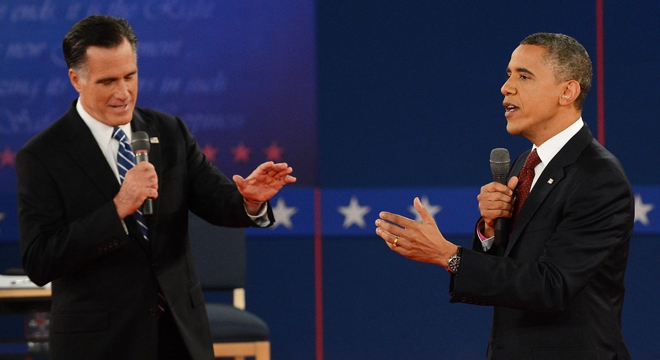Sunday 21 October 2012 - 14:08
Story Code : 8288
The foreign poicy debate--Iran's nuclear aspirations and Israel
The upcoming�foreign policy debate, in addition to the issue of leadership style, may find the biggest differences between Governor�Romney�and President�Obama�on issues of�Iran�s nuclear aspirations and relations with�Israel. It is here that both men�s view of US leadership and role in the world may become the most pronounced.
Romney will tell Obama that when it comes to Iran�s nuclear capability and Israel the US cannot lead from behind. Obama will argue that he has 4 years of experience and Romney is a rookie who could be too quick to use force of arms.
We can expect Romney to draw his own red line and it will match closely the one drawn by Prime Minister Netanyahu. Romney will argue that the US and its allies, including Israel, must prevent Iran from acquiring nuclear weapons capability. (The difference between capability and Obama�s stated red line of having a nuclear weapon could be significant. Romney could argue that Obama�s policy would allow Iran to enrich and stockpile weapons-grade uranium. So that it would then be able to carry out the final step necessary to make a nuclear weapon secretly and quickly. The argument would continue that Obama�s current policy is unenforceable). (Israeli Prime Minister Netanyahu devoted much of his speech before the United Nations in September to drawing out this distinction in red lines.)
Romney may also critique the administration for its varied efforts to prevent Israel from attacking Iran by itself. He will probably say that the distance between Israel and the US has never been greater.
Obama will argue that the US has had and will continue �to have Israel�s back� and that all options remain on the table. He will argue that there is no credible evidence that Iran has decided to build a nuclear weapon. This will be questioned by Romney who may invoke his longtime relationship with Netanyahu.
If Obama challenges the concept of red lines, Romney may answer that a red line is a tool of diplomacy that can create stability and avoid possible conflicts. It provides the context for meaningful negotiations.
Romney has in the past pointed to America�s perceived weakness by the rulers of Tehran, saying that Iran �has never acted less deterred by America.� This could be tied back to the President�s strategy and defense budget.
Obama will argue that the toughest sanctions ever imposed are working and they just need time to bring Iran around to the allies� way of thinking. Romney should be expected to respond that absent a credible military threat and without enforceable red lines, economic sanctions are ineffective. Because of the under-enforcement and all of the waivers that have been granted. He may also raise the Russian and Chinese help in Iran�s avoidance of some of the impact of the sanctions.
For sanctions to be effective the people must rise up and resist the regime. However, in the past the administration did not support the Iranian pro-reform movement. Romney has pledged to stand with the people of Iran against the regime.
This could be one of the most contentious subjects of the debate.
The Iran Project is not responsible for the content of quoted articles.
# Tags











